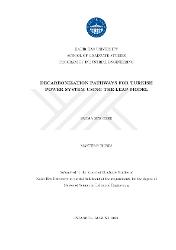| dc.contributor.advisor | Kirkil, Gökhan | en_US |
| dc.contributor.advisor | Yücekaya, Ahmet Deniz | en_US |
| dc.contributor.author | Özer, Fatma Ece | |
| dc.date.accessioned | 2022-03-25T08:30:53Z | |
| dc.date.available | 2022-03-25T08:30:53Z | |
| dc.date.issued | 2021 | |
| dc.identifier.uri | https://hdl.handle.net/20.500.12469/4301 | |
| dc.description.abstract | The negative impact of GHG released into the atmosphere on global warming cannot be ignored. Fossil-fueled power plants constitute a large part of Turkey's electricity production, as every country has a growing economy. Therefore, the electricity generation sector accounts for a significant portion of GHG emissions in Turkey. In addition to national bindings such as the Paris Agreement and the Kyoto Protocol, it is known that the Republic of Turkey aims to make not only electricity but also energy production greener in the coming years, in line with its own efforts. For this purpose, there are different modeling studies in the literature. This thesis aims to model Turkey's electricity generation sector in 2017, reveal the current situation, and then analyze how a greener and sustainable energy transformation will be possible with different scenarios and different main factors. In this direction, Turkey's electricity generation sector was modeled using the LEAP tool, then the decarbonization scenarios created within the openENTRANCE project were adapted to Turkey's data, and the numerical results of the scenarios were compared. As a result, it has been revealed that social awareness, adaptation to new technologies, and incentives of decision-makers are all critical factors in this regard. | en_US |
| dc.description.abstract | Atmosfere salınan GHG'in küresel ısınmaya olan olumsuz etkisi göz ardı edilemez. Fosil yakıtlı elektrik üretim santralleri, ekonomisi büyümekte olan her ülke gibi Türkiye'nin de elektrik üretiminin büyük bir kısmını oluşturmaktadır. Dolayısıyla, elektrik üretim sektörü Türkiye'deki GHG salınımının önemli bir kısmını meydana getirmektedir. Paris Anlaşması ve Kyoto Protocol'ü gibi ulusal bağlayıcıların yanı sıra Türkiye Cumhuriyeti Devleti'nin kendi yaptığı çalışmalar doğrultusunda ön-ümüzdeki yıllarda sadece elektrik değil enerji üretimini de daha yeşil hale getir-meyi amaçladığı bilinmektedir. Bu amaçla literatürde yapılan farklı modelleme çalışmaları bulunmaktadır. Bu tezin amacıysa, Türkiye'nin 2017 yılındaki elektrik üretim sektörünü modelleyerek, güncel durumun gözler önüne serilmesi ve ardın-dan oluşturulan farklı senaryolar, farklı ana etkenlerle daha yeşil ve sürdürülebilir enerji dönüşümünün nasıl mümkün olacağını analiz etmektir. Bu doğrultuda, LEAP aracı kullanılarak Türkiye'nin elektrik üretim sektörü modellenmiş, ardından openENTRANCE projesi kapsamında oluşturulan dekarbonizasyon senaryoları Türkiye verilerine uyarlanmıştır ve senaryoların sayısal sonuçları karşılaştırılmıştır. Bunun sonucunda sosyal farkındalık, yeni teknolojilere adaptasyon ve karar-alıcıların teşviklerinin üçünün de bu doğrultuda önemli etkenler olduğu ortaya konmuştur. | en_US] |
| dc.language.iso | eng | en_US |
| dc.publisher | Kadir Has Üniversitesi | en_US |
| dc.rights | info:eu-repo/semantics/openAccess | en_US |
| dc.subject | Endüstri ve Endüstri Mühendisliği | en_US |
| dc.subject | Industrial and Industrial Engineering | en_US |
| dc.subject | Enerji | en_US |
| dc.subject | Energy | en_US |
| dc.title | Decarbonization pathways for Turkish power system using the leap model Leap modeli kullanılarak Türkiye elektrik sistemi için dekarbonizasyon yolları | en_US |
| dc.type | masterThesis | en_US |
| dc.authorid | 0000-0002-8627-9131 | en_US |
| dc.department | Enstitüler, Lisansüstü Eğitim Enstitüsü, Endüstri Mühendisliği Ana Bilim Dalı | en_US |
| dc.institutionauthor | Özer, Fatma Ece | en_US |
| dc.relation.publicationcategory | Tez | en_US |
| dc.identifier.yoktezid | 698937 | en_US |
















